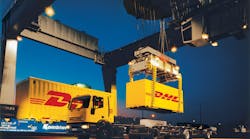A new study examining the economic impact of the four member companies of the Global Express Association (GEA) – DHL Express, FedEx Corp., TNT and United Parcel Service – estimates they “facilitated” some three million jobs worldwide in 2013, representing 0.19% of global gross domestic product (GDP) or over $140 billion in economic activity.
“Our results are based on GEA member data only and should therefore be viewed as a conservative estimate of the overall footprint of the express delivery industry,” the trade group said. “We have not ‘grossed up’ the figures to account for other express delivery service providers.”
The GEA’s study – entitled Express Delivery and Trade Facilitation: Impacts on the Global Economy and conducted by European consulting firm Frontier Economics – calculated that the express delivery industry provides almost 600,000 direct jobs and supports over 1.8 million indirect jobs while supporting over 570,000 “induced” jobs.
Frontier also analyzed the GEA’s ‘Customs Capability Database’ – a tool that measures key performance indicators of border management in 140 countries – and related it to express shipment volumes in 10,000 country pairs.
The firm found that express delivery volume grew on average by 7% over the past five years, despite the impact of the “Great Recession, with the fastest growth taking place outside Europe and North America.
Frontier also determined that implementing a single additional trade facilitation measure, for instance providing 24/7 automated customs processing, could boost a nation’s trade volume some 4.4% on average over time.
For example, the firm calculated that if Bolivia introduced two of the customs capabilities measures (e.g. 24/7 automated processing and adapted working hours) its trade volumes would increase by 8.8% or $2.03 billion. Similarly if Cameroon implemented electronic customs, trade would increase by over 4.3% or some $670 million, Frontier found.
“This analysis shows conclusively that international express delivery is one of the key channels that enables … an increase in trade,” GEA noted.
The rise of e-commerce is also expected to impact trade as well, Frontier’s research concluding, with double-digit e-commerce growth expected to be the norm in the near future as it becomes increasingly global with regions outside of Europe and North America growing faster than the average.
“These trends suggest that international express delivery services are likely to play an increasing role in facilitating internationalization of businesses, particularly small and medium enterprises that are unlikely to set up their own supply chains,” GEA noted.
“However, in the context of the emergence of international e-commerce there are signs that there may be a return to some form of protectionism,” the group cautioned. “The rise in protectionism or delays in reform could hinder the realization of the e-commerce expansion, which is expected to be a key driver of economic growth.”



